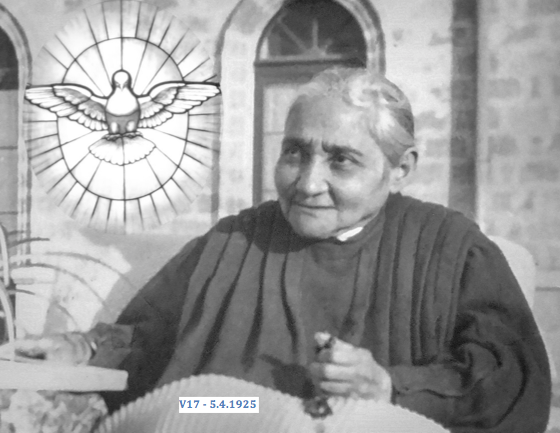Patience doesn’t mean resignation. Patience derives from patior, a Latin verb that means: I share, I feel the same thing. It is the virtue of great souls, very much necessary in everyday life. We often encounter physical and moral difficulties, painful family situations, people that need to be listened to and are in need of compassion; situations that we must face with patience, imitating the patience of God who is patient, for He became flesh and came to share our situation and human condition. Unfortunately, we almost always overlook the fact that the best evangelization campaign can be our own life. In fact, if we let ourselves be totally guided by the Holy Spirit who is in us, our life would produce a precious fruit that would end up drawing the interest of and attracting people to Christ.
The characteristics of this fruit, described in Gal 5:22, set believers apart and make them a light in the midst of darkness. God desires that His children be similar to Him, and we can be, giving space to His Spirit in our minds, in our hearts and in our souls. Jesus explains to Luisa the greatness of the virtue of patience and affirms that patience is superior to purity, because without patience, the soul easily breaks free and it is difficult to remain pure, and when one virtue needs another virtue in order to have life, the latter virtue is called superior to the former. In fact, one can say that patience is the guardian of purity and not only that, but it is the ladder in order to climb the mountain of fortitude, in such a way that if one went up without the ladder of patience, he would immediately plummet from the highest point to the lowest.
In addition to this, patience is the seed of perseverance and this seed produces branches called firmness. How firm and stabile in the good undertaken is the patient soul! She pays no attention to rain, frost, ice, or fire, but all of her attention is on bringing to completion the good she has started. For there is no greater foolishness than that of one who today does some good and tomorrow, because he finds no more pleasure, neglects it. What would one say about an eye that at one hour possesses sight and at another remains blind? Of a tongue that now speaks and now remains mute? Patience alone is the secret key to open up the treasure of virtues; without the secret of this key, the other virtues do not come out to give life to the soul and render her noble.
Patience seems like something as long extinct as the “dinosaurs”! For us human beings, this word might exist only as an exclamation of exasperation or of resignation. Indeed, patience is divine. God demonstrates an immense patience towards man, but also asks us to be patient like Him, patient in circumstances, patient with others, patient in trials, patient with ourselves. Patience is not an option for us believers. Without this characteristic, the fruit of the Holy Spirit is not complete.
Given that none of the parts comprising the fruit of the Spirit exclude the others, since they are all fundamentally connected to each other, patience, which is more useful than all the others in everyday life, is linked to love. You cannot love without being patient and you cannot be patient if you do not love. Love produces patience, it manifests itself in patience and, if it is the love of God making us capable of love, to cultivate this love is patience.
Jesus again states in the writings of Luisa that, in addition to the food of love, He desires the bread of patience from the soul, for patient and suffering love is the most solid, the most satisfying and strengthening food because if love is not patient, one can say that it is wretched love, light and without any substance, lacking the necessary material in order to form the bread of patience. In imitation of Jesus, Christian patience is the free acceptance of that which crucifies us in life, a loving conformity to the Will of God. Patience, in fact, can be defined as the virtue of those who know how to tolerate serenely and for a long time all that which, to a greater or lesser extent, is unpleasant, irritating, painful: the ability to know how to wait for things to come and to remain firm during adversity, the capacity to know how to wait for God in His time and in His plans. Jesus says to Luisa that the most certain sign of loving the Lord is the cross, but the cross borne with patience and resignation, because where there is patience and resignation in crosses, there is Divine Life. Since our nature is so reluctant to suffer, if there is patience, it cannot be something natural but divine, and the soul no longer loves the Lord only with her love, but united to the love of the Divine Life: therefore, what doubt can she have whether she loves or not, if she arrives at loving Him with His same love? If she lacks patience, she lacks love because love is only known by sacrifice, while the cross, patience and resignation are fruits that produce only grace and love.
Jesus continues to emphasize that the cross is a treasure. And where is the most secure place to put this precious treasure in safety? The soul is the most secure place when she is disposed with patience, with resignation and with the other virtues to receive this treasure, for the virtues are many keys that guard it from being squandered and exposed to thieves, and if this treasure does not find especially the golden key of patience, it will find many thieves that will steal and squander it. In addition, every suffering that the soul suffers is a dominion of herself that acquires more because patience in suffering is regime. Ruling herself, the more the soul suffers, the more dominions she acquires and she does nothing but expand and enlarge her kingdom of Heaven, purchasing immense riches for eternal life. For every additional thing that one suffers, one acquires another kingdom in her own soul, which is a kingdom of grace corresponding to a reign of virtue and glory.
In his letter to the Colossians, the apostle Paul exhorts us to clothes ourselves with patience: “Put on, then, as God’s chosen ones, holy and beloved, heartfelt compassion, kindness, humility, gentleness, and patience” (Col 3:12). It is up to us, therefore, not to God, to cloth ourselves with patience. It is our responsibility to do it, because what will happen to us in the future depends on how we cloth ourselves. Just as in the natural we dress ourselves daily, so also in the spiritual we must wear the garment of patience every day, not occasionally.
Once again Jesus explains to Luisa how patience feeds the virtues. Patience is the nourishment of perseverance, because patience keeps the passions in their place and strengthens all the virtues, and the virtues, receiving the act of continuous life from patience, do not feel the fatigue that inconstancy produces, so easy to the creature. Therefore the soul does not get despondent if she is mortified or humiliated because patience immediately administers to her the necessary food and forms there a stronger and more stable knot of perseverance.
We must exercise our patience, above all, in our relationship with God. When the fruit of the Spirit grows and becomes more mature, so does the quality of our relationship with God, ceasing the monologue and starting the listening. The Scriptures urge us to learn how to wait in silence and to place ourselves in a listening position in order to be able to grasp the counsel of God, knowing that the first to have patience is God, who waits for everyone to come to repentance. If at times there are moments of temptation, we must not get disturbed. For Jesus reassures us, telling Luisa that often it is He who leads the soul into the depths of the abyss in order to be able to then lead her more directly to Heaven. Furthermore, patience, humiliation, the offering to God of that which one suffers in times of temptation form the satisfying bread that one gives to our Lord and that He accepts with much delight.
Let us strive, then, to put on patience and fortify ourselves in it. Let us reflect on the negative effects produced by our lack of patience and ask God to forgive us for the tensions and resentments that its absence in us has produced in our lives. Let us try to always keep the smile in our eyes, peace on our face and sweetness in our words.
Father Mariano from Torino, whose heroic virtues were recognized, used to say: “I don’t know if there is a saint by the name of Patience, but there should be because it is necessary; in fact, three things are needed for living: a pinch of science, a spoonful of prudence and a barrel of patience”.
If there isn’t a saint by the name of Patience, it is however certain that patience is sanctifying.

